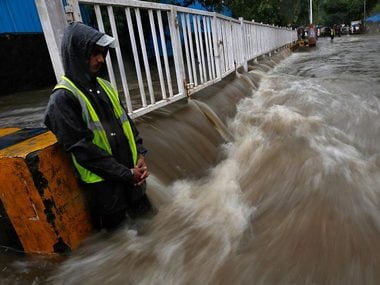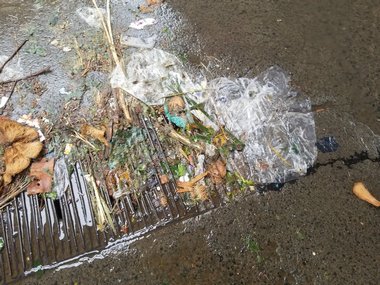Editor’s note: This article was originally published on 10 July. It is being republished in light of the heavy rains that lashed Mumbai on Wednesday, leaving many parts of the city waterlogged. This year’s monsoon in Mumbai was significantly delayed, but when it finally arrived, it brought along with it all-too-familiar tales of flooding and disruption. Apart from chronic flooding spots like Hindmata Junction and Kurla, other parts of the city like Malad and parts of Navi Mumbai also saw unusually high levels of waterlogging. Experts and environmentalists have pointed to long-term factors as being the causes of the flooding. Stalin Dayanand, Director of Projects at NGO Vanshakti, said, “Mumbai is now condemned to face flooding every year – I am saying this as a responsible environmentalist. Unless we stop constructing on the flood plains, the city will continue to be inundated during the monsoons. Before the construction of the Bandra-Kurla Complex (BKC), the western suburbs had not faced this kind of flooding. At least after the 2005 deluge, planners should have stopped further construction in the area. But construction is still going on, and a huge mall is being set up in the precinct.” A similar concern was raised after the 2005 deluge by a “Concerned Citizens’ Commission Panel” headed by retired Supreme Court judge Justice PB Sawant. The panel had said, “It also seems that it is only the encroachments along a narrow point along the Mithi river which are being targeted as illegal and unlawful structures…the authorities continue to look the other way when similar encroachments like the ‘G’ block of the Bandra-Kurla Complex (BKC) that has been constructed (sic) on the mouth of the Mithi, blocking the inter-tidal zone to the detriment of large parts of Mumbai.” [caption id=“attachment_6965561” align=“alignleft” width=“380”]  A flooded street in Mumbai earlier this week. Reuters[/caption] Dayanand disputed Brihanmumbai Municipal Corporation chief Praveen Pardeshi’s claim that the floods this time were caused by climate change . He said, “Mumbai always had heavy rains. It is just that earlier, there were avenues for the rainwater to disperse, and these do not exist now.” While some activists have raised concerns over neglect of mangroves, Dayanand points out that as per official data, mangrove cover had increased in recent years. “The problem is that we try to contain the floodwaters in the narrow channels of the BRIMSTOWAD (Brihanmumbai Storm Water Disposal System) canals. Although the authorities increased the capacity of the nallahs, they did not account for the possibility of sea water entering them. Since these nallahs are not at an elevation, the water remains stagnant in them and causes flooding.” The panel mentioned above also raised serious concerns about the city’s storm water drainage system, saying, “The drainage situation in the suburbs is characterised by illogical or unplanned development, without keeping drainage requirements in mind. First, the BMC has degraded all the natural rivers and creeks in Mumbai by calling them all ‘nallahs’. The concept of maintaining the flood plains of these natural water systems has been completely forgotten, and in fact, all attempts have been made to narrow and ‘train’ these natural water systems. The banks of nallahs or erstwhile streams/rivulets/rivers/creeks have been developed on with no regard for the storm water capacity required. Whilst in absolute terms much of the development is of a temporary and informal nature, some large pucca structures, both government and private, also restrict water flow.” Mumbai’s drainage system dates back over a hundred years to the British era and was designed for a maximum rainfall of 25 mm per hour. It was also designed assuming a 0.5 runoff coefficient — that is, that half the rain would be absorbed and only half would flow into the drainage system. However, since then, open spaces have drastically shrunk, with concrete roads and buildings greatly reducing the chances of water seeping into the ground. After the 2005 deluge, the BMC had planned the BRIMSTOWAD project. Under the project, capacities of drains are to be increased and pumping stations are to be constructed. However, until 2017, the BMC had not even finished half the projects under the project, as per a report in Hindustan Times. [caption id=“attachment_6965491” align=“alignright” width=“380”]  A drain in Mumbai blocked by garbage, including plastic. Image courtesy: Twitter/@AfrozShah1[/caption] The challenge of plastic pollution Plastic pollution has emerged as a major cause behind flooding particularly in the areas around the Mithi river. Mumbai generates around 700 metric tonnes of plastic waste per day, much of which ends up choking drains and clogging natural water systems like the Mithi river. In this regard, lawyer and activist Afroz Shah said, “There are three problems leading to pollution in the Mithi river — solid waste, liquid waste and waste that is dumped by people who live alongside it. The third one is the most crucial. Rejuvenating the river is a social process, and the problem is not one that can be solved merely by issuing tenders.” Shah, best known for spearheading the Versova Beach clean-up, has focused his attention on the Mithi river since November 2018. He says, “When there was flooding in my area, I saw that all the storm water drains were filled with plastic. This needs to be dealt with. The plastic ban does not adequately cover it as it only deals with certain kinds of plastic bags, straws and bottles. However, the plastic ban does not deal with multi-layer packaging which is used for, let’s say, packets of biscuits or chips. Such packaging is not recyclable. The authorities need to put pressure on these big companies in this regard.” Shah also said that growing concretisation is a cause for repeated inundation seen in parts of Mumbai. “Due to this, rain falls on to cement or tar roads, and then it goes into the drains, and then the river. According to me, at least half a kilometre on either side of the Mithi river should have been left free from concretisation.”
Constructions on flood plains, concretisation and plastic pollution are causes behind the repeated flooding in Mumbai, say activists.
Advertisement
End of Article


)

)
)
)
)
)
)
)
)



